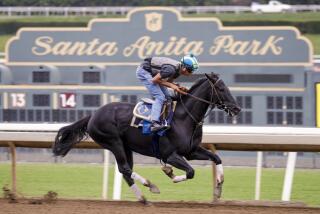Life in War Internment Camps
- Share via
In response to the unkind remarks (regarding recent congressional approval to offer an apology and payments of $20,000 each to Japanese-Americans interned during World War II) made by Norman T. Vick of Seal Beach, and Norman Scheck of Sherman Oaks (letters, Aug. 13), I wish to let them know of my feelings as an ex-internee.
In early 1942, I and many others were sent to the Santa Anita Race Track in Arcadia for the first step of internment. We were all housed in horse stables--you know where the horses sleep and eat. Dirt floors, no windows. Just a big Dutch-door in front. The walls were so dirty--stained from dried up horse stuff--manure and hay, and what not. The families with children were treated slightly better. They were housed in barracks which were hastily built. In our stable there were four of us, all young girls. We were treated no better than horses, except each of us got a cot for a bed. Very depressing.
But being young, we tried to do the best under the circumstances. We gave a good scrubbing to the walls--it took us a good part of the day; we were half choking over the fumes of horse odor. It was awful. On top of that the following day it rained. Very hard too.
The food in the camp was not bad, that is if you’re standing in the line early. Otherwise, the day’s menu ran out fast before your turn came. The mess hall was not far, but the line was always long. Sometimes it was too hot to stand long under the hot sun. I saw some people just keel over from the heat. One day I was late for the mess hall. When I got there, my dinner consisted of chopped raw cabbage and cold rice. That was the remnant of the day’s menu of wieners and sauerkraut. We all knew the nation had meat and butter rationing, but still, that was unbearable.
A good many young people, mostly college student-internees, were working making camouflage nets for the Army. They usually worked late. They were not the early arrivals for the mess line. They must have been shocked as much as I was that day and protested vigorously. I learned a few days later The Times reported “Japs in the camp revolted over the menu of wieners and sauerkraut.” What a laugh!
We stayed at Santa Anita about eight or nine months before we were shipped out to the various regions of the deserts. Almost all of camps were built in the middle of vast windy deserts where sandstorms were not uncommon. When they hit, the sky was quickly darkened with sand and dust blowing very hard, coming through the cracks. In no time everything was covered by thick, heavy dust.
My parents always admired the U.S. as a great country, and we were all very proud of being American.
The monetary award is very justifiable, and we’re grateful.
ROSE S. IKEDA
Costa Mesa
More to Read
Sign up for The Wild
We’ll help you find the best places to hike, bike and run, as well as the perfect silent spots for meditation and yoga.
You may occasionally receive promotional content from the Los Angeles Times.






